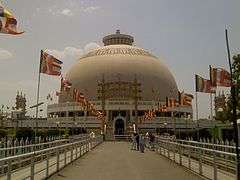Marathi Buddhists
 Deekshabhoomi monument, located in Nagpur, Maharashtra, where B. R. Ambedkar converted to Buddhism in 1956, is the largest stupa in Asia.[1] | |
| Total population | |
|---|---|
| 6,531,200 (2011) | |
| Regions with significant populations | |
| India | |
| Languages | |
| • Marathi | |
| Religion | |
| Navayana Buddhism (or Neo-Buddhism) | |
| Related ethnic groups | |
| • Mahars • Marathi people |
Marathi Buddhists are a religious community which is residing in the Indian state of Maharashtra. They speak Marathi as their mother-tongue (first language). There are 6 percent of people in Maharashtra who are Buddhists.
According to 2011 Indian census, There were 6,531,200 Buddhists in Maharashtra which constituted 5.81% of the state. [2] 5,204,284 (79.68%) Marathi Buddhists belong to the Scheduled Caste.[3]
Marathi Buddhists account for 77.36% of all Buddhists in India.[2] Almost all Marathi Buddhists belong to the Navayana tradition, a 19th and 20th-century Buddhist revival movement in India that received its most substantial impetus from B. R. Ambedkar who called for the conversion of Dalits to Buddhism since he believed that the caste"Dalits" where originally Buddhists.
History
Almost all Marathi Buddhists are converts from Hinduism. Most Buddhist Marathi people belong to the former Mahar community who adopted Buddhism en masse with Ambedkar in 1956.[4][5]
Notable People
Namdeo Dhasal (Padma Shri)
Singers
Anand Shinde
Adarsh Shinde
Actors
See also
References
- ↑ Bhagwat, Ramu (19 December 2001). "Ambedkar memorial set up at Deekshabhoomi". Times of India. Retrieved 1 July 2013.
- 1 2 "Population by religion community – 2011". Census of India, 2011. The Registrar General & Census Commissioner, India. Archived from the original on 25 August 2015.
- ↑ "बौद्ध बढ़े, चुनावी चर्चे में चढ़े". aajtak.intoday.in (in Hindi). Retrieved 30 January 2018.
- ↑ Jaffrelot, Christophe (2005). "The 'Solution' of Conversion". Dr Ambedkar and Untouchability: Analysing and Fighting Caste. Orient Blackswan Publisher. pp. 119–131. ISBN 8178241560.
- ↑ Zelliot, Eleanor (1978). "Religion and Legitimation in the Mahar Movement". In Smith, Bardwell L. Religion and the Legitimation of Power in South Asia. Leiden: Brill. pp. 88–90. ISBN 9004056742.